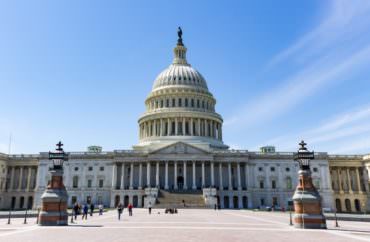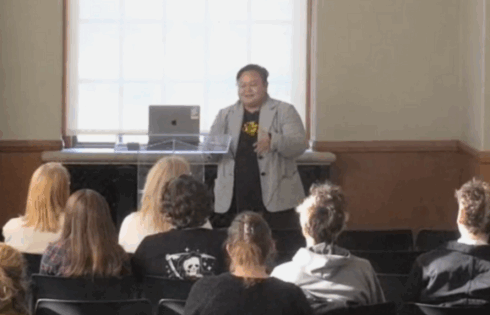
The U.S. government should spend a minimum of $10 to $12 trillion on reparations to the descendants of slaves, according to two scholars recently hosted by the McCoy Family Center for Ethics in Society at Stanford University.
William “Sandy” Darity Jr., the Samuel DuBois Cook distinguished professor of public policy at Duke University, and scholar A. Kirsten Mullen, a folklorist, museum consultant and lecturer, made the comments as panelists at the “Resurrecting the Promise of Forty Acres” event.
“The federal government is the one that has the capacity to meet the bill,” Darity said, “but it also has the responsibility to meet the bill.”
Darity and Mullen are co-authors of the book “From Here to Equality: Reparations for Black Americans in the 21st Century,” which lays out a plan for this type of restitution. Under the plan, each descendant would receive $280,000, with families receiving $850,000.
TODAY! Join us at 4 pm PT for an important discussion on #reparations for Black Americans. @SandyDarity & A. Kirsten Mullen will discuss the limitations of piecemeal attempts, how to determine the size of the fund, & how best to disburse it. OPEN TO ALL. https://t.co/v3BmdOAiI4 pic.twitter.com/zdpC8wRFz4
— Stanford Ethics (@StanfordEthics) February 25, 2021
“True reparations would eliminate racial disparities in wealth, income, education, health, sentencing and incarceration, political participation, and [create] subsequent opportunities to engage in American political and social life,” Mullen said at the Stanford event, held Feb. 25.
Mullen said the government should spend a minimum of $10 to $12 trillion on reparations for descendants of slaves.
“The primary objective of a reparations plan,” Darity said, “must include elimination of the racial wealth differential, and this is something that would be accomplished by an expenditure of somewhere in the vicinity of $10 to $12 trillion.”
For reference, the federal budget which President Donald Trump approved in 2020 was about $4.8 trillion.
The College Fix attended the event virtually and made an audio recording. The two scholars emphasized at the 75-minute event that these reparations would not be limited to atonement for slavery.
They divided American history into three main periods: slavery; Jim Crow and massacres of black people by whites; and a post-Civil-Rights era of “mass incarceration,” all of which they say took away black wealth.
“We focus heavily on the racial wealth gap,” Darity said, “as the index of the cumulative harms across all three phases, and it is only black Americans who are descendants of persons enslaved in the United States who have that history shaping their wealth gap.”
According to Darity and Mullen, reparations would be exclusively for those who can trace their lineage back to people who had been enslaved, rather than those who came voluntarily after the passage of the 13th Amendment.
“These immigrants,” said Mullen, “who came to the United States in the 1960s and later did not arrive here in chains. They made a conscious decision to come here.”
Mullen went on: “I always want to ask the question: ‘So did you not see those television programs, those newsreels with the police and the German Shepherds when black people were marching and you thought: ‘I’m gonna come to the United States, and I’m gonna live a different kind of life?’”
They also made a distinction between black slaves and white indentured servants, arguing that there was no equivalency between the two groups. According to Darity and Mullen, indentured servants could buy their freedom and also lived and worked in better conditions, both before and after emancipation.
Their plan focused heavily on the unique burden of the federal government to provide the restitution.
“It’s impossible for state and local governments to actually meet the bill for full compensation … the total budgets for all state and local governments in the United States, combined, amounts to about $3.1 trillion,” Darity said.
Mullen said that one common objection to their plan is that “only a small fraction of southerners owned slaves.”
The book places the national percentage of American families who owned slaves at 8 percent in 1860. But, Mullen pointed out, in southern states, that percentage ranged from the low end of 20 percent to the high end of 49 percent in the same year.
The two also called upon colleges and universities to be leaders in pushing for reparations.
“Perhaps the most prestigious universities in the eastern part of the United States all have deep connections to slavery and the slave trade,” Darity said. He also mentioned that the biological science department at UC Berkeley was created by two fugitive slaveowners.
“I think they should lead the charge, lead the charge for a national program of reparations … put that incredible muscle, that intellectual fervor to work lobbying and petitioning Congress for reparations,” Mullen said.
MORE: Emory to offer scholarships for descendants of slavery
IMAGE: Shutterstock
Like The College Fix on Facebook / Follow us on Twitter






Please join the conversation about our stories on Facebook, Twitter, Instagram, Reddit, MeWe, Rumble, Gab, Minds and Gettr.